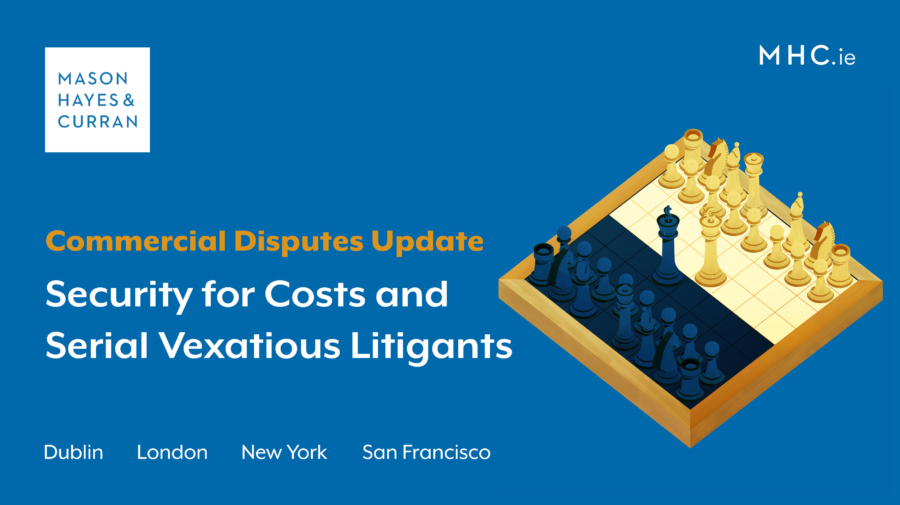Security for Costs and Serial Vexatious Litigants

The High Court has highlighted a pressing issue with serial vexatious litigants who exploit the legal system to harass opponents and drain resources. In a novel ruling, the Court suggested that requiring such individuals to provide security for costs—typically reserved for corporate plaintiffs—could be an effective deterrent. Our Commercial Disputes team explores how this decision marks a potential shift in how courts tackle serial litigants who abuse the system.
The High Court has recently addressed a case involving serial litigants who had pursued what were determined to be vexatious or annoying proceedings.[1] The Court held that, because ordinary cost consequences were ineffective, there was no disincentive for individuals who sought to pursue hopeless or vexatious litigation. Without one, Mr Justice Twomey felt that these litigants inflict injustice on their opponents and make a mockery of the courts system. Consequently, Mr Justice Twomey noted that the only effective way to discourage them was to ensure they had “something to lose”. He explained that this could be achieved by requiring them to put up security for costs. This would need to happen before they were allowed to continue with the litigation.
Background
The parties to the case had been involved in lengthy historic litigation. The litigation was about the repayment of a substantial loan taken out to purchase a development site in Co Wicklow. Following a lengthy trial in 2020, the Court ordered the defendants to pay €22 million. The defendants appealed, unsuccessfully, to the Court of Appeal and Supreme Court.
The High Court, in 2024, granted an ‘Isaac Wunder’[2] order preventing the defendants from issuing new proceedings regarding the same dispute. Even though the trial and appeals had already been decided against them, the defendants filed a new motion in the original High Court proceedings. This was also despite the Isaac Wunder order, which prevented further legal action on the same issue. The defendants sought to overturn the original High Court judgment, claiming that they had been afforded permission to apply. They alleged that there was new evidence that had not been available to the trial judge. Mr Justice Twomey heard the motion, which not only effectively sought to get around the Isaac Wunder order, but also ignored the appellate ruling regarding the initial High Court decision.
Decision
Mr Justice Twomey began his judgment by noting that a “significant and disproportionate amount of court time is taken up by a very small number of litigants… with nothing to lose… relentlessly pursuing hopeless and vexatious claims”. The result of this was that “instead of administering justice, those litigants are using the courts to inflict injustice on innocent parties”. Further, he asserted that they “are making a mockery of the courts system as well as using up taxpayer funded resources.”
He observed that a common feature in cases involving serial vexatious litigants was that, for a variety of reasons, they do not end up paying the costs of their opponent. Consequently, without an effective cost consequence, “the only effective disincentive to a person taking hopeless or vexatious claims… is, in fact, absent.” He further noted that they have “nothing to lose”. This is because, by virtue of the current law and practice relating to security for costs[3], individual litigants are rarely, if ever, required to lodge money into court by way of security for costs. In this way, vexatious individual litigants could continue abusing court processes and/or making hopeless and vexatious claims.
Mr Justice Twomey specifically contrasted the “stark” position of this type of litigant with corporate litigants. He noted that, in the case of corporate litigants acting as plaintiffs, the court could require them to provide security for costs. If there is a prospect that a corporate litigant may not be in a position to pay the cost of its opponent should it lose, the court will usually require it to pay money into court before being allowed to proceed. As a consequence, because of that effective financial disincentive, he stated that “it is rare to see a corporate litigant subject to an Isaac Wunder order or held to have abused court process.”
He therefore concluded that, for litigants like the defendants here, “there is no effective financial disincentive to stop them weaponizing the legal system.” Instead, if they had to put up their own money to pursue their claims, they would “come to a shuddering halt”. As a result, he determined that an effective disincentive should be found to prevent the abuse of the courts by the small percentage of vexatious litigants. That effective deterrent, said Mr Justice Twomey, was the actual payment, upfront in security for costs, of an amount of money before being allowed continue to litigate. Accordingly, he stated:
“The only way to prevent this further abuse of the court system by litigants like the McDonaghs and to prevent the infliction of further injustice on innocent parties is by requiring individual litigants to put up security for costs. This would mean that the McDonaghs would be required to put up security for costs before being permitted to pursue an appeal.”
Conclusion
Although Isaac Wunder orders can be used, they are not easy to get. The High Court has acknowledged that there is an issue with stopping persistent vexatious litigants. The problem is that there are no strong financial penalties to discourage them. Ordinary cost orders have little consequence as these litigants typically have no resources to meet them.
Without something to lose, these types of litigants can essentially ‘weaponise the legal system’ by causing their opponents to incur further irrecoverable costs. This is unfair on those opponents and other courts users, as well as a waste of court time and resources. The recognition that security for costs, which has typically been limited in availability, can be that effective disincentive in these cases is a novel development.
In particular, the Court did not identify any court rule, legislation or case law giving rise to the entitlement to order security for costs in these circumstances. It remains to be seen[4] if it will be applied more generally against serial vexatious litigants, especially given it has potential implications for the constitutional right of access to justice. If it is to be applied in other litigation of a similar nature, it would represent an important protection for those litigating against these individuals.
For more information and expert advice on commercial disputes, contact a member of our Commercial Disputes team.
The content of this article is provided for information purposes only and does not constitute legal or other advice.
[1] Ulster Bank DAC & Ors v. McDonagh & Ors [2024] IEHC 609
[2] An ‘Isaac Wunder’ order is an order restricting the ability of vexatious litigant(s) to bring legal proceedings without leave of the court (Wunder v Irish Hospitals Trust, Supreme Court, unreported, Walsh, Haugh and O’Keeffe JJ., 24 January 1967).
[3] A procedure (in the High Court under Order 29 of the Rules of the Superior Courts) whereby, before being allowed to continue the litigation, a plaintiff is required to provide security for the costs the defendant may incur in defending the proceedings if the claim ultimately fails.
[4] Especially if appealed and, as of the date of writing, the appeal period had not yet expired.
Share this:



